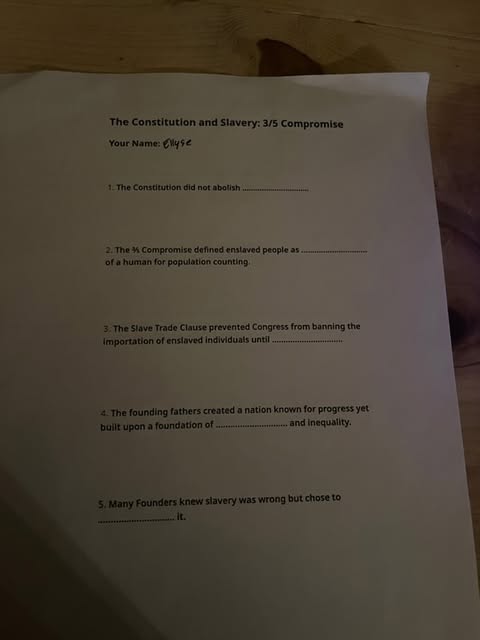The Constitution did not abolish slavery. The 3/5 Compromise defined enslaved people as three-fifths of a human for population counting. The Slave Trade Clause prevented Congress f... The Constitution did not abolish slavery. The 3/5 Compromise defined enslaved people as three-fifths of a human for population counting. The Slave Trade Clause prevented Congress from banning the importation of enslaved individuals until 1808. The founding fathers created a nation known for progress yet built upon a foundation of slavery and inequality. Many Founders knew slavery was wrong but chose to tolerate it.

Understand the Problem
The question is asking for information related to the Constitution and its implications for slavery, particularly focusing on the 3/5 Compromise and related historical issues. The approach involves filling in the blanks with relevant historical knowledge.
Answer
1. slavery 2. three-fifths 3. 1808 4. slavery 5. tolerate
- The Constitution did not abolish slavery. 2. The 3/5 Compromise defined enslaved people as three-fifths of a human for population counting. 3. The Slave Trade Clause prevented Congress from banning the importation of enslaved individuals until 1808. 4. The founding fathers created a nation known for progress yet built upon a foundation of slavery and inequality. 5. Many Founders knew slavery was wrong but chose to tolerate it.
Answer for screen readers
- The Constitution did not abolish slavery. 2. The 3/5 Compromise defined enslaved people as three-fifths of a human for population counting. 3. The Slave Trade Clause prevented Congress from banning the importation of enslaved individuals until 1808. 4. The founding fathers created a nation known for progress yet built upon a foundation of slavery and inequality. 5. Many Founders knew slavery was wrong but chose to tolerate it.
More Information
The Constitution contained language that indirectly addressed slavery, reflecting the complex and contradictory nature of the nation's founding.
Tips
A common mistake is assuming the terms 'slavery' and 'slave' appear directly in the Constitution, which they do not.
Sources
- Three-fifths compromise | Definition, Purpose, & History | Britannica - britannica.com
- Interpretation: The Slave Trade Clause | Constitution Center - constitutioncenter.org
- Historical Context: The Constitution and Slavery - gilderlehrman.org
AI-generated content may contain errors. Please verify critical information